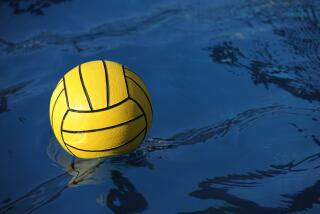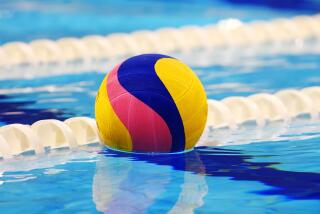Vargas Is a Little Fish in the Biggest Pool : Water Polo: Smallest member of U.S. Olympic team uses wile, quickness to come up with the big plays in the clutch.
NEWPORT BEACH â International water polo is not the best place for a little guy. Not with pools populated with 6-foot-8 Hungarians and rules that permit physical play.
But if size is an issue for John Vargas, the smallest member of the U.S. national team, itâs not a large one.
Although he was the final player cut from the 1988 U.S. Olympic team, Vargas has become a valuable member of the 1992 team, which opens play Aug. 1 in Barcelona against Australia.
Vargas, who is 5-10, 160 pounds in his Speedo, makes up for the size disadvantage by outthinking his opponents.
âHeâs not going to beat you every time physically, but mentally heâs going to try to be one, two or three steps ahead of you,â said Chris Duplanty, a goalkeeper on the U.S. team.
Said Bill Barnett, who coaches the national team: âJohn Vargas is extremely smart. Itâs like having another coach in the water.â
And in fact, that is literally true. Vargas is a coach; heâs one of the most successful high school coaches in Southern California. In nine seasons at Corona del Mar High, he has led the Sea Kings to six Southern Section 4-A title matches, where they have won four championships.
Vargas said he will resign his position at Corona del Mar after the fall season. He and his fiancee, Lisa Marie Jurcazak, plan to marry and move to Madrid, Spain, where Jurcazak works as an international stockbroker.
Vargas, who made an unsuccessful bid to coach the U.S. junior national team, hopes to continue coaching, possibly in Spain or possibly as an assistant on the national team.
About the only certainty, Vargas says, is that he wonât be playing internationally after these Olympics.
âRight now, Iâm having the best time in my life playing, but I want to move on to a different part of the game,â Vargas said. âI just want to finish on a winning note, and I think we will in the Olympics, and thatâs how I want to end my career.â
Vargas turned to coaching reluctantly after helping UC Irvine to an undefeated season and the NCAA championship in 1982, his senior year.
He wanted to concentrate on playing, but Barnett and UCI Coach Ted Newland suggested he apply when the Corona del Mar job became available.
Turns out that he not only discovered a vocation, but also found that coaching made him a better player.
âItâs really helped my play because by continuing to stress fundamentals with the kids, Iâm able to react in certain situations without having to think,â Vargas said. âIâve thought about it so much, it just happens.â
Vargasâ mix of pool smarts, quickness and precise passing make him one of the most valuable players, especially during man-advantage situations, Barnett said.
âHe directs the counterattack to a great degree and he sets his teammates up for shots with his assists,â Barnett said.
âThe only thing we have to worry about is if they take him inside. Then we have to make a quick switch.â
Itâs a role-playerâs role, which suits Vargas fine.
âIâd rather have the big boys get tired and then let me come in when I think Iâll be more effective,â he said.
âTo me starting means nothing. Itâs being in at the end that means something.â
Fortunately for the U.S. team, Vargas was in the pool in the waning seconds in the semifinals of the FINA World Cup last summer. The Americans, who eventually defeated Yugoslavia in the final for their first major international title of the modern era, were tied with Spain with 10 seconds left in the match.
Vargas and team captain Terry Schroeder were next to each other near the goal when Vargas took a pass from mid-pool.
âI picked it up to look to shoot, and two of the Spanish guys came at me and fouled me,â Vargas said. âI just flipped it over my head and Terry backed-handed it into the cage.â
More to Read
Go beyond the scoreboard
Get the latest on L.A.'s teams in the daily Sports Report newsletter.
You may occasionally receive promotional content from the Los Angeles Times.





